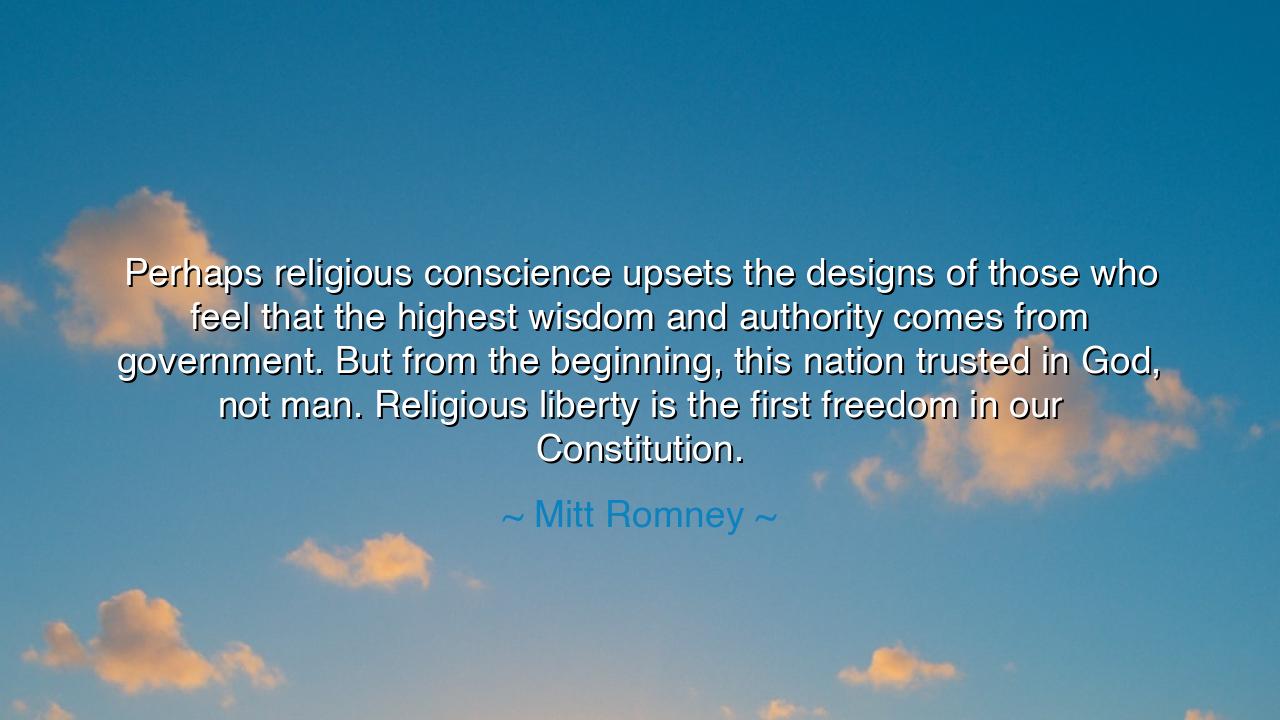
Perhaps religious conscience upsets the designs of those who
Perhaps religious conscience upsets the designs of those who feel that the highest wisdom and authority comes from government. But from the beginning, this nation trusted in God, not man. Religious liberty is the first freedom in our Constitution.






Hearken, O children of reflection, to the words of Mitt Romney, who speaks of the sacred bond between religious conscience and the foundations of freedom. He observes that the moral compass of the soul may, at times, upset the designs of those who place highest wisdom and authority in the hands of men or governments. Here lies a teaching for the ages: true liberty arises not merely from laws, but from the recognition that the human spirit, guided by conscience and divine understanding, holds a power beyond earthly authority.
The origin of this reflection is rooted in Romney’s life as a statesman and thinker, drawing upon the history of a nation forged upon principles of faith and moral guidance. He invokes the founding understanding that the people, from the earliest days of the republic, trusted in God, not man, embedding in the Constitution a safeguard for the liberty of the spirit. The words remind us that religious liberty—the right to worship and to follow conscience—is the first freedom, the cornerstone upon which all other liberties stand.
The meaning of this aphorism is profound: the authority of government, while necessary to maintain order and justice, is subordinate to the primacy of conscience and the sacred guidance of the Divine. When men attempt to dictate matters of belief or morality, they risk trampling the rights that sustain both virtue and freedom. Romney’s counsel is clear: a society thrives only when it honors the freedom of the spirit, allowing each soul to follow the dictates of conscience without coercion or suppression.
History provides testimony to this truth. Consider the Pilgrims of Plymouth, who fled persecution to establish a community where they could worship freely. Their courage to defy earthly authority in obedience to conscience laid the foundations for religious liberty in the New World. Their struggle illuminates Romney’s teaching: the protection of religious conscience is essential to the flourishing of civilization, for it aligns law with virtue and freedom with moral responsibility.
Moreover, this principle endures in every era. From communities defending their sacred rites to individuals exercising conscience in defiance of unjust edicts, the recognition of religious liberty safeguards the moral and spiritual health of the nation. Romney reminds all that the trust in God, not man, is not a call to theocracy, but a recognition that human authority is fallible, while the conscience guided by divine principle remains a beacon of truth and justice.
O generations yet unborn, take this counsel into your hearts: cherish the sacred right to religious conscience, honor the first freedom enshrined in law, and remember that the legitimacy of governance rests upon respect for the spirit, not mere enforcement of power. For it is in the protection of conscience and the cultivation of moral liberty that a nation endures, its people guided by both justice and the eternal light of divine wisdom.






CCCon Chuot
I’m struck by the idea that religious liberty is foundational to the nation’s identity. How does this align with pluralism in a modern, diverse society where multiple faiths and non-religious beliefs coexist? Does asserting God as a source of ultimate wisdom risk privileging some religious perspectives over others? It also makes me wonder about the practical implications: how can governments ensure policies respect religious conscience while protecting the rights and freedoms of all citizens equally?
LTLE THU
This statement prompts reflection on the role of conscience in civic life. Should individuals always act according to religious convictions even if they conflict with legal requirements, and how should the law respond? I’m curious about historical and modern examples where religious conscience has clashed with government policies—what lessons can be learned about compromise, tolerance, and the limits of authority? It also raises broader questions about how societies define the hierarchy of freedoms and the ethical responsibilities of citizens.
ASNguyen Thi Anh Sam
Reading this, I’m intrigued by the historical framing of religious liberty as the first freedom. Does this reflect the founders’ intention to limit government overreach into spiritual matters, or is it more about moral guidance in governance? I also wonder how this principle interacts with contemporary debates over church and state, such as healthcare mandates, education, or public ceremonies. Can a society trust both God and man simultaneously, or does prioritizing one create unavoidable tensions?
BHbao han
I find this perspective thought-provoking because it positions religious freedom as foundational to national identity. How does this principle apply when religious beliefs conflict with civil rights or public policy? Does prioritizing religious conscience create tension with democratic principles, or does it reinforce the protection of minority beliefs against majority rule? It also raises questions about how modern governments can respect this freedom while maintaining equality and order for all citizens.
PTpham phuong thao
This quote makes me reflect on the balance between government authority and individual religious conscience. How should a society navigate conflicts between laws and deeply held religious beliefs? I’m curious whether emphasizing religious liberty as the first freedom implies that other rights are secondary, or if it’s a statement about historical context. Additionally, does trusting in God rather than man suggest a limit to government intervention, and how does this reconcile with secular governance in a diverse society?